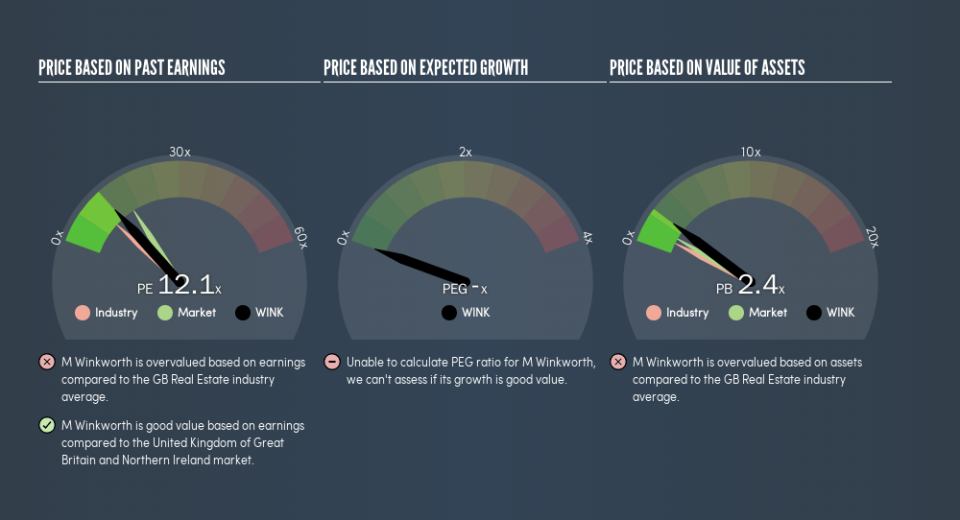Despite Its High P/E Ratio, Is M Winkworth PLC (LON:WINK) Still Undervalued?

This article is for investors who would like to improve their understanding of price to earnings ratios (P/E ratios). We’ll look at M Winkworth PLC’s (LON:WINK) P/E ratio and reflect on what it tells us about the company’s share price. M Winkworth has a P/E ratio of 12.11, based on the last twelve months. That means that at current prices, buyers pay £12.11 for every £1 in trailing yearly profits.
See our latest analysis for M Winkworth
How Do I Calculate A Price To Earnings Ratio?
The formula for price to earnings is:
Price to Earnings Ratio = Price per Share ÷ Earnings per Share (EPS)
Or for M Winkworth:
P/E of 12.11 = £1.09 ÷ £0.090 (Based on the year to June 2018.)
Is A High Price-to-Earnings Ratio Good?
A higher P/E ratio means that buyers have to pay a higher price for each £1 the company has earned over the last year. All else being equal, it’s better to pay a low price — but as Warren Buffett said, ‘It’s far better to buy a wonderful company at a fair price than a fair company at a wonderful price.’
How Growth Rates Impact P/E Ratios
When earnings fall, the ‘E’ decreases, over time. That means unless the share price falls, the P/E will increase in a few years. So while a stock may look cheap based on past earnings, it could be expensive based on future earnings.
M Winkworth increased earnings per share by an impressive 15% over the last twelve months. Unfortunately, earnings per share are down 2.8% a year, over 5 years.
How Does M Winkworth’s P/E Ratio Compare To Its Peers?
The P/E ratio essentially measures market expectations of a company. As you can see below, M Winkworth has a higher P/E than the average company (10.4) in the real estate industry.
That means that the market expects M Winkworth will outperform other companies in its industry. Clearly the market expects growth, but it isn’t guaranteed. So investors should delve deeper. I like to check if company insiders have been buying or selling.
Don’t Forget: The P/E Does Not Account For Debt or Bank Deposits
Don’t forget that the P/E ratio considers market capitalization. In other words, it does not consider any debt or cash that the company may have on the balance sheet. Hypothetically, a company could reduce its future P/E ratio by spending its cash (or taking on debt) to achieve higher earnings.
Spending on growth might be good or bad a few years later, but the point is that the P/E ratio does not account for the option (or lack thereof).
How Does M Winkworth’s Debt Impact Its P/E Ratio?
Since M Winkworth holds net cash of UK£3.2m, it can spend on growth, justifying a higher P/E ratio than otherwise.
The Bottom Line On M Winkworth’s P/E Ratio
M Winkworth’s P/E is 12.1 which is below average (16) in the GB market. It grew its EPS nicely over the last year, and the healthy balance sheet implies there is more potential for growth. The below average P/E ratio suggests that market participants don’t believe the strong growth will continue.
Investors have an opportunity when market expectations about a stock are wrong. If the reality for a company is not as bad as the P/E ratio indicates, then the share price should increase as the market realizes this. So this free visual report on analyst forecasts could hold the key to an excellent investment decision.
You might be able to find a better buy than M Winkworth. If you want a selection of possible winners, check out this free list of interesting companies that trade on a P/E below 20 (but have proven they can grow earnings).
We aim to bring you long-term focused research analysis driven by fundamental data. Note that our analysis may not factor in the latest price-sensitive company announcements or qualitative material.
If you spot an error that warrants correction, please contact the editor at editorial-team@simplywallst.com. This article by Simply Wall St is general in nature. It does not constitute a recommendation to buy or sell any stock, and does not take account of your objectives, or your financial situation. Simply Wall St has no position in the stocks mentioned. Thank you for reading.

